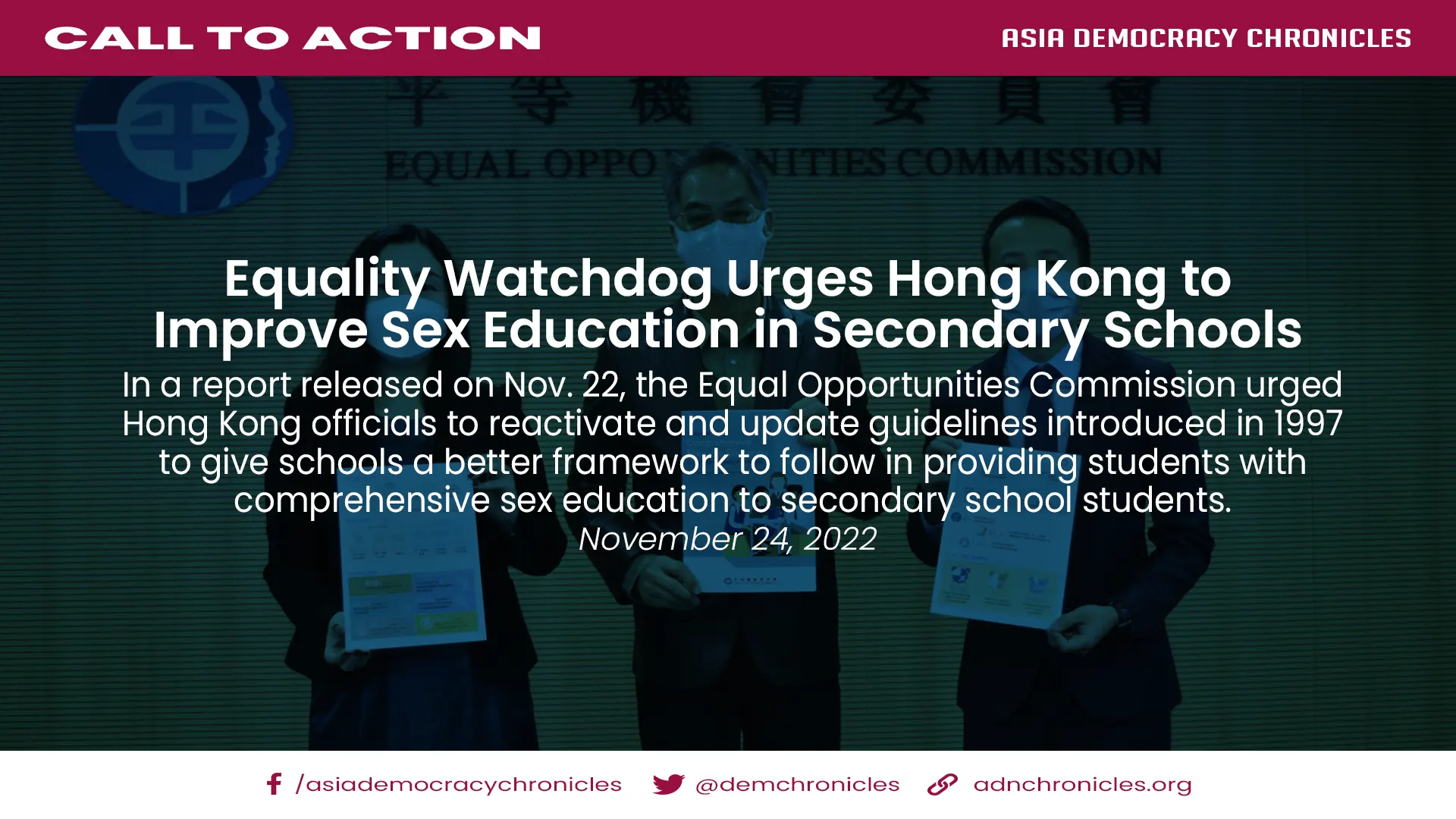|
Getting your Trinity Audio player ready...
|
24 November 2022
Secondary schools in Hong Kong are not spending enough time and resources on providing students with comprehensive sex education, according to the city’s equality watchdog. It urged the government to reactivate and update guidelines introduced in 1997 to give schools a better framework to follow.
The Equal Opportunities Commission (EOC) on Tuesday released the findings of a study it conducted on sexuality education in secondary schools in the city between November 2020 and April 2021. The EOC invited all 473 local secondary schools to fill in a questionnaire, and received 203 valid ones in return.
The study found out that 13.8 per cent of respondents – or around 28 schools – did not teach sex education in class, and 12.3 per cent did not organise any related activities in the 2018-2019 school year. Data from that year was used as classes in subsequent years were disrupted or suspended because of the Covid-19 pandemic.
Insufficient time allocated
For schools that offered sex education, more than 90 per cent of them spent 20 hours or less in the academic year on the subject. Nearly half allocated five hours or less to sex education.
Citing government guidelines drafted specifically for sex education and issued in 1997, EOC Executive Director Ferrick Chu said it was suggested that junior form students spend 36 hours on sex education per academic year, while 30 hours were recommended for senior form pupils. The guideline is no longer referenced in current curriculums, but the data collected by the watchdog reflected a significant gap between the initial recommendations and reality.
Currently, sex education is incorporated as part of the Values Education Curriculum Framework, a pilot scheme rolled out in 2021 which also includes subjects such as civic education and national education. There is no guideline for how long should be spent teaching sex education in the framework.
“If there’s a guideline specifying at least how many hours should be allocated for sex ed, I think schools [would] have more incentive to do that and squeeze time for teaching sex ed,” said James Chan, senior policy, research and training officer at EOC.
In post-questionnaire focus group studies, many teachers reflected that “everything is competing for time,” Chan added, saying that the priority of sexuality education was comparatively low.
The watchdog also admitted it was an uphill battle to make education officials, schools and parents place more importance on this aspect of education.
“I think there are a lot of different factors come into play when we are talking about how to ‘reform’ the sexuality education structure. It really depends whether [the authorities] take it as a priority… We have [had] discussions with the [Education Bureau] in the past few years, apparently that’s not their priority,” Chu said.
Chu added sometimes public pressure was needed to make the government reconsider its priorities.
He also said the watchdog had been pushing for improving sex education in schools because it received a number of complaints related to sexual harassment each year and many of them stemmed from a lack of awareness.
Noting the EOC called it sexuality education, not just sex education, Chu said it was because it was not only about the physical or biological aspects of sex, but also about concepts such as gender identities, gender relationships, equality and respect for different genders.
Lack of training for educators
Other issues identified in the EOC study included the lack of designated staff to take charge of sexuality education, and the fact that most teachers who were responsible for teaching the subject were not trained to do so.
Additionally, under the current system, schools adopted a “school-based” and “cross-disciplinary” approach when it came to sexuality education – meaning the school could decide on things like whether to teach the subject or not, what to teach, how to teach it and how much time to spend on it.
The problem with that, according to the EOC, was that learning outcomes varied to an extent that may be considered inadequate. And teachers across different disciplines may not know what has been covered and what has not.
EOC recommendations
The EOC recommended introducing a standardised framework or guidelines to give schools a better reference to plan their teaching. It also suggested authorities provide incentives for teachers to receive training or take development courses. Subsidies for schools to hire external parties, such as non-governmental organisations to provide such sexuality education would be important too, the watchdog said.
Schools meanwhile, should set up a designated post of sexuality education coordinator, to oversee matters related to the subject. The government should consider giving schools funding to set up such a post. #



















